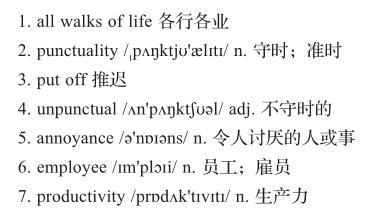时间即生命
Time is money, time is life, especially in this modern society of ours. It is important not only to businessmen but to people from all walks of life1.
Punctuality2 is a habit. We can, if wed like, get into the habit of doing things at the right time. But it is not easy to do this. Many people are likely to be late for one reason or another. No one likes to be late but we often let people wait for us, dont we?
It is much easier to put things off3, and say we will do them tomorrow or next week. Because it is easy to be unpunctual4, many of us get into the bad habit of always being late for everything. And once we get into this bad habit, it is very hard to get rid of it.
An unpunctual person is an enemy to himself, and an annoyance5 to everyone else. In school, the boy who is always late and behind with his lessons gets into trouble and learns little. An unpunctual employee6 will soon lose his job. And a friend who always keeps you waiting may lose your friendship.
The idea of punctuality is very important. You lose out on chances, respect and time when you are late.
To be punctual means to do what you should do on time, and a punctual person is in the habit of doing things at the proper time and is never late for his dates or meetings—which is especially important in this fast developing society. To a worker, time is productivity7. To students, time is knowledge.
時间即金钱,时间即生命,尤其在如今这摩登世界。时间的意义不仅限于买卖者,各色人等都无法轻视。
守时是一种习惯。只要有此愿望,我们就能做到定时完成任务。但守时并非易事,迟到的借口总是层出不穷。明明不愿做等待之人,我们却总是让他人翘首。
拖延容易守时难。“明天再说”“下周再做”成了我们的口头禅。不知不觉,我们养成了事事迟到的坏习惯。殊不知,这习惯克服起来有多难。
无法守时之人成了自己的敌人、他人的麻烦。学校的学生磨磨蹭蹭,不仅耽误学业,还会惹上麻烦;一个屡屡迟到的员工,说不准便丢了工作;总是姗姗来迟的朋友,无疑在拿友谊做赌注。
守时,是一种美德。没有时间观念的人,失去的是机遇与尊重。
守时,意味着在对的时间做该做的事。既与他人约定了时间,便断不能迟到。在如今高速发展的社会,守时显得弥足重要。对工人,时间即生产力;对学生,时间即知识。
推荐语:
时间是什么?梁实秋说,时间即生命。没有人不爱惜他的生命,但很少有人珍视他的时间。这时代有太多的事情等着我们去做,守时不仅是一种社交礼貌,更是一种诚信和尊重他人的美德。努力做到守时,是人人应有的处事态度。

